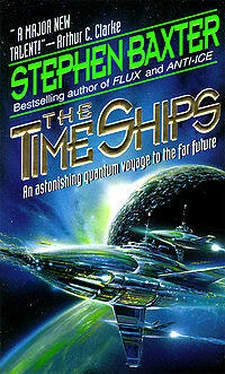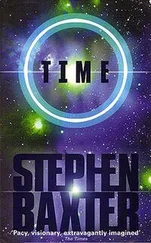He consented. I nodded to him and, without further ado, I set off down the corridor to my laboratory.
So I took my leave of the world of 1891. I have never been a man of deep attachments, and I am not one for flowery farewells; but had I known I should never see the Writer again — at least, not in the flesh — I fancy I would have made something more of a ceremony of it!
I entered my laboratory. It was laid out something like a milling-shop. There was a steam lathe attached to the ceiling, which powered various metal-turning machines by means of leather bands; and fixed to benches around the floor were smaller lathes, a sheet-metal stamp, presses, acetylene welding sets, vices and the like. Metal parts and drawings lay about on the bench, and abandoned fruits of my labors lay in the dust of the floor, for I am not by nature a tidy man; lying at my feet now, for example, I found the nickel bar which had held me up before my first sojourn into time — that bar which had proved to be exactly one inch short, so that I had had to get it remade.
I had spent much of two decades of my life in this room, I reflected. The place was a converted conservatory, giving onto the garden. It was built on a framework of slender, white-painted wrought iron, and had once given a decent view of the river; but I had long since boarded up the panes, to assure myself of a consistency of light and to deter the curious eyes of my neighbors. My various tools and devices loomed in that oily darkness, and now they reminded me of my half-glimpses of the great machines in the caverns of the Morlocks. I wondered if I myself might not have some morbid streak of the Morlock! When I returned, I resolved, I would kick out the boards and glaze up the room once again, and make it a place of Eloi light rather than Morlock gloom.
Now I walked forward to the Time Machine.
That bulky, askew thing sat against the north-west side of the workshop — where, eight hundred millennia away, the Morlocks had dragged it, in their efforts to entrap me inside the pedestal of the White Sphinx. I hauled the machine back to the south-east corner of the laboratory, where I had built it. That done, I leaned over and, in the gloom, made out the four chronometric dials which counted the passage of the machine through History’s static array of days; now, of course, the hands were all set to zero, for the machine had returned to its own time. Beside this row of dials, there were the two levers which drove the beast, one for the future, and one for the past.
I reached out and, on impulse, stroked the lever for futurity. The squat, tangled mass of metal and ivory shuddered like a live thing. I smiled. The machine was reminding me that it was no longer of this earth, of this Space and Time! Alone of all the material objects of the universe, save for those I had carried on my own person, this machine was eight days older than its world: for I had spent a week in the era of the Morlocks, but had returned to the day of my departure.
I dropped my pack and camera to the floor of the laboratory, and hung up my hat on the back of the door. Remembering the Morlocks’ fiddling with the machine, I settled myself to checking it over. I did not trouble to clean off the various brown spots and bits of grass and moss which still clung to the machine’s rails; I have never been one for fussy appearances. But one rail was bent out of shape, and I twisted that back, and I tested the screws, and oiled the quartz bars.
As I worked, I remembered my shameful panic when discovering the machine lost to the Morlocks, and I felt a deep surge of affection for the ugly thing. The machine was an open cage of nickel, brass and quartz, ebony and ivory, quite elaborate — like the workings of a church clock, perhaps — and with a bicycle saddle set incongruous in the middle of it all. Quartz and rock crystal, suffused with Plattnerite, glimmered about the framework, giving the whole a sense of unreality and skewness.
Of course none of it would have been possible without the properties of the strange substance I had labeled “Plattnerite.” I remembered how, by chance, I had come into possession of a sample of that material: on that night, two decades earlier, when a stranger had walked up to my door and handed me a packet of the stuff. “Plattner,” he had called himself — he was a bulky chap, a good few years older than myself, with an odd, broad, gray-grizzled head, and dressed in peculiar jungle colors. He instructed me to study the potent stuff he handed me, in a glass medicine jar. Well, the stuff had sat uninvestigated on a shelf in the laboratory for over a year, while I progressed with more substantive work. But at last, on a dull Sunday afternoon, I had taken the jar down from its shelf…
And what I had found out had, at last, led to — this!
It was Plattnerite, suffused into quartz rods, which fueled the Time Machine, and made its exploits possible. But I flatter myself to think that it took my own combination of analysis and imagination to realize and exploit the properties of that remarkable substance, where a lesser man may have missed the mark.
I had been reluctant to publicize my work, outlandish as the field was, without experimental verification. I promised myself that direct on my return, with specimens and photographs, I would write up my studies for the Philosophical Transactions; it would be a famous addition to the seventeen papers I had already placed there on the physics of light. It would be amusing, I reflected, to call my paper something dry such as “Some Reflections on the Anomalous Chronologic Properties of the Mineral ’Plattnerite,’ “ and to bury within it the thunderous revelation of the existence of time travel!
At last I was done. I set my hat square over my eyes once more, and I picked up my pack and camera and fixed them under the saddle. Then, on a sudden thought, I went to the fireplace of the laboratory and picked up the poker which stood there. I hefted its substantial mass in my hand — it might be useful! — and I lodged it in the machine’s frame.
Then I sat myself in the saddle, and I placed my hand on the white starting levers. The machine shuddered, like the animal of time it had become.
I glanced around at my laboratory, at the earthy reality of it, and was struck how out-of-place we both looked in it now — me in my amateur explorer’s garb, and the machine with its otherworldliness and its stains and scuffs from the future — even though we were both, in a way, children of this place. I felt tempted to linger. What harm would it do to expend another day, week, year here, embedded in my own comfortable century? I could gather my energies, and heal my wounds: was I being precipitate once again in this new venture?
I heard a footstep in the corridor from the house, a turn of the door handle. It must be the Writer, coming to the laboratory.
Of a sudden, my mind was set. My courage would not grow any stronger with the passage of any more of this dull, ossified nineteenth-century time; and besides, I had said all the good-byes I cared to make.
I pressed the lever over to its extreme position. I had that odd sense of spinning that comes with the first instant of time travel, and then there came that helpless, headlong feel of falling. I think I uttered an exclamation at the return of that uncomfortable sensation. I fancy I heard a tinkle of glass: a skylight pane, perhaps, blown in by the displacement of air. And, for a shredded remnant of a second, I saw him standing there in the doorway: the Writer, a ghostly, indistinct figure, with one hand raised to me — trapped in time!
Then he was gone, swept into invisibility by my flight. The walls of the laboratory grew hazy around me, and once more the huge wings of night and day flapped around my head.
Читать дальше
Конец ознакомительного отрывка
Купить книгу









